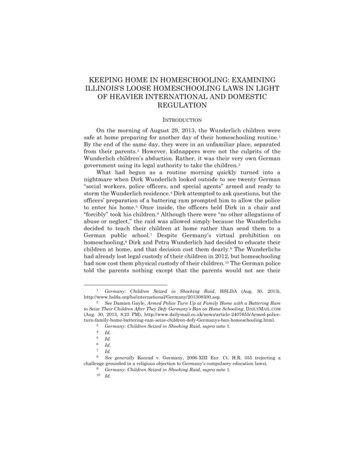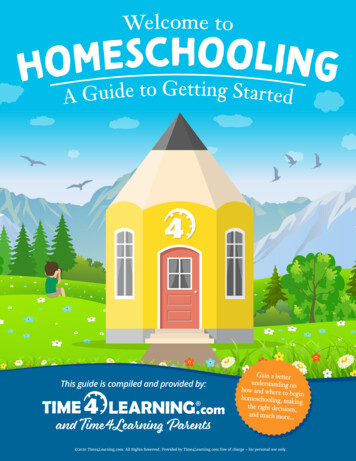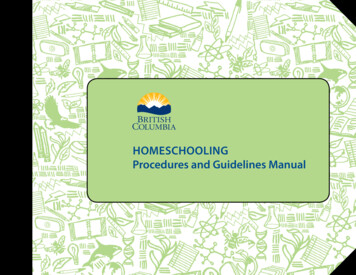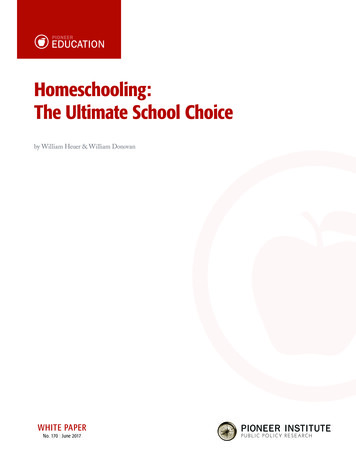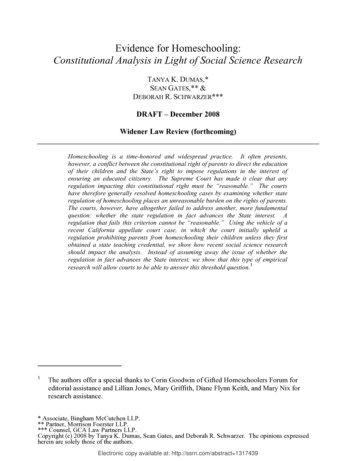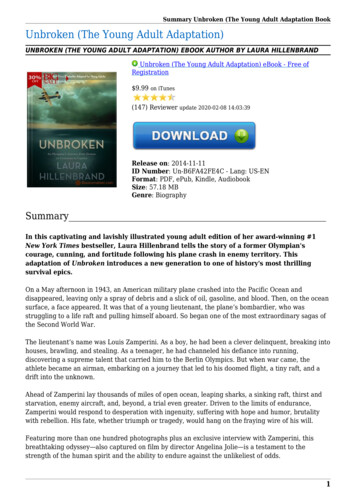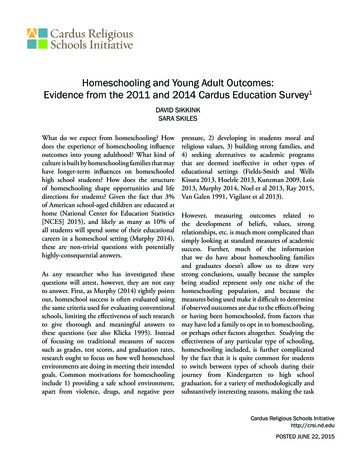
Transcription
Homeschooling and Young Adult Outcomes:Evidence from the 2011 and 2014 Cardus Education Survey1DAVID SIKKINKSARA SKILESWhat do we expect from homeschooling? Howdoes the experience of homeschooling influenceoutcomes into young adulthood? What kind ofculture is built by homeschooling families that mayhave longer-term influences on homeschooledhigh school students? How does the structureof homeschooling shape opportunities and lifedirections for students? Given the fact that 3%of American school-aged children are educated athome (National Center for Education Statistics[NCES] 2015), and likely as many as 10% ofall students will spend some of their educationalcareers in a homeschool setting (Murphy 2014),these are non-trivial questions with potentiallyhighly-consequential answers.As any researcher who has investigated thesequestions will attest, however, they are not easyto answer. First, as Murphy (2014) rightly pointsout, homeschool success is often evaluated usingthe same criteria used for evaluating conventionalschools, limiting the effectiveness of such researchto give thorough and meaningful answers tothese questions (see also Klicka 1995). Insteadof focusing on traditional measures of successsuch as grades, test scores, and graduation rates,research ought to focus on how well homeschoolenvironments are doing in meeting their intendedgoals. Common motivations for homeschoolinginclude 1) providing a safe school environment,apart from violence, drugs, and negative peerpressure, 2) developing in students moral andreligious values, 3) building strong families, and4) seeking alternatives to academic programsthat are deemed ineffective in other types ofeducational settings (Fields-Smith and WellsKisura 2013, Hoelzle 2013, Kunzman 2009, Lois2013, Murphy 2014, Noel et al 2013, Ray 2015,Van Galen 1991, Vigilant et al 2013).However, measuring outcomes related tothe development of beliefs, values, strongrelationships, etc. is much more complicated thansimply looking at standard measures of academicsuccess. Further, much of the informationthat we do have about homeschooling familiesand graduates doesn’t allow us to draw verystrong conclusions, usually because the samplesbeing studied represent only one niche of thehomeschooling population, and because themeasures being used make it difficult to determineif observed outcomes are due to the effects of beingor having been homeschooled, from factors thatmay have led a family to opt in to homeschooling,or perhaps other factors altogether. Studying theeffectiveness of any particular type of schooling,homeschooling included, is further complicatedby the fact that it is quite common for studentsto switch between types of schools during theirjourney from Kindergarten to high schoolgraduation, for a variety of methodologically andsubstantively interesting reasons, making the taskCardus Religious Schools Initiativehttp://crsi.nd.eduPOSTED JUNE 22, 2015
of figuring out which school settings had what effect. They also find that adherence to traditionaleffects on students especially difficult.beliefs carry over into beliefs about social issuesthat are generally in line with conservative andCertainly, quite a few methodologically competent Fundamentalist Christian beliefs, such as thestudies have been conducted from which we immorality of premarital sex, cohabitation, andhave learned about the motivations for choosing same-sex marriage. In general, then, Pennings ethomeschooling, as well as the experiences of al (2011) find that homeschooling families haveparents who educate their children at home been successful in preserving and transmitting(Fields-Smith and Wells Kasura 2013, Kunzman religious and moral beliefs, a major goal of the2009, Lois 2013, Mazama and Lundy 2013, religious homeschooling movement.Vigilant et al 2013), but only one study to date(Pennings et al 2011) has been able, given the Pennings et al (2011) also reported thatappropriate type of data and methods, to detail homeschool graduates are less likely to attendand explain what becomes of homeschooled college, and that when they do attend college,students once they graduate from high school, they enroll at less prestigious universities with lessand how their outcomes compare to students stringent admissions criteria than do students fromeducated in more traditional settings.all other sectors. Likewise, homeschool graduatesare less likely to earn either college degrees orPennings and colleagues (2011) find (looking graduate degrees. They are also more likely to feelonly at “religious homeschooling” families, a sense of helplessness in the face of struggles, andcharacterized by mothers who attend religious lack clarity and goals about the future. All of thisservices at least once a month) that homeschool suggests that academic and personal achievementgraduates attend religious services significantly after high school is on average less well-supportedmore often, have a stronger sense of obligation through the homeschool experience. Finally,to remain obedient to church leadership, and Pennings et al (2011) find that homeschoolare more likely to hold the beliefs that the Bible graduates marry earlier in life than do graduates ofis inerrant and that moral and religious beliefs other types of high schools, and are less politicallyare absolute than are graduates from all other active, giving some evidence that the importanceschool sectors save Protestant school graduates, that homeschoolers place on the preservation andwith whom they were on par on all counts. formation of strong family bonds and a sense ofAlthough these represent only a few measures of independence from public institutions is payingreligiosity, these results do strongly suggest that off.homeschooling families have been successful intheir objective of helping their children to build The current paper follows up and expands onstrong (evangelical Protestant) religious beliefs the Pennings et al (2011) report with moreand commitments. However, and interestingly, recent data from the same study, focusing solelyPennings and his colleagues found no homeschool on homeschooling graduates, and discussingadvantage in terms of private religious practices counter-cultural emphases within homeschoolinglike praying or reading the Bible alone compared to and the consequent social boundaries that lead topublic school graduates, but did find a Protestant forms of alienation from public institutions andschool advantage, suggesting that avoiding these mainstream culture, as well as on the relationactivities is not necessarily a cohort or generational between family and school, both of which, we2
suggest, lead to a particular set of outcomes for peer effects within most institutional schools isyoung adults who were educated at home.not likely to be matched in the homeschoolingcontext, leaving family and religion as the twoprimary socializing forces in many homeschoolers’How Do We Expect That Homeschoollives.Graduates Are Doing?The lack of separation of family and school islikely to have effects on student outcomes aswell as their experiences during childhood andadolescence. Normative life trajectories thatguide students from traditional schooling are lessinfluential for students educated at home sincethey are reinforced neither within homeschoolpeer groups nor through school structures. Asimple example is the relation between secondaryschools and higher education. Norms aboutcollege attendance after high school can bereinforced within school through relationshipsbetween schools and colleges, such as collegerecruiters visiting campus and an ongoingrelationship between high school counselorsand college admission offices. That normativetrajectory for homeschoolers is less well-defined,less institutionalized. The homeschool lifetrajectory is much more open-ended, and morelikely to vary across families. What is (and is not)expected after high school, especially regardingfurther education, may enhance homeschoolingeffects into the young adult years.Many homeschooling families are “embattled andthriving,” a phrase used to emphasize the countercultural stances important for identity formationwithin the religious field (Smith and Emmerson1998). We would expect homeschooling to fostera sense of alienation from public institutions,in part due to the struggles the homeschoolingmovement has endured to gain legal recognitionand social acceptance. The sense of needing to beon guard against and build social boundaries toprotect families from potential threats to what formost is a way of life no doubt leads to a sense ofbeing an embattled minority.In this sense, homeschoolers have experiencedbeing an educational minority. As homeschoolingfamilies build identities over and against thedominant schooling trajectories in the fight forlegal and social legitimation, they are likely toconstruct stronger boundaries between theirexperience and public institutions than arefamilies whose children are not educated at home,giving them fewer opportunities to adopt positiveattitudes toward public institutions.Further, it would not be surprising ifhomeschooling orientations that emphasizeThe most obvious structural difference between interpersonal relationships over formal institutionshomeschooling and other forms of institutional would have long-term effects on the trajectorieseducation is the relation between education and of homeschoolers. For example, leaving homefamily. The structural divide between family and for a college experience may seem unnecessaryschool makes it more likely that institutional and inconvenient when learning has beenschooling relative to homeschooling will diminish experienced in the intimate sphere of the familythe direct influence that families have on and outside of formal institutional channels.students. Though homeschooling networks and Perhaps that reduces homeschoolers’ interest incooperatives generate consistent peer relationships getting involved in formal organizations in thefor homeschooled students, the strength of community or workplace.3
Given this understanding of how homeschoolingfamilies choose to conduct at least a portion of theirlives free of the constraints of social institutions,we expand upon the Pennings et al (2011) reportof homeschool graduates by increasing the sizeof the pool of homeschoolers with whom we canexamine various young adult outcomes, and alsoby discussing how homeschoolers’ participationin social institutions might be different than thatof those educated in more conventional settings,specifically by examining participation in civicand political life, as well as contributions to thepublic good.Pennings et al (2011) study reviewed above. Weanalyze data from the Cardus Education Survey,a nationally representative sample of over 3,000U.S. high school graduates, ages 24 to 39. Theserespondents were part of an Internet paneladministered by GfK, which is primarily based ona random selection of households in the UnitedStates. In order to represent relatively smallprivate schooling sectors, GfK oversampled nonpublic high schoolers. The study was conducted in2011 and repeated in 2014. The 2011 data werefirst analyzed in the Pennings et al 2011 paper.For the current report we merged both studiesto increase the sample size of respondents whoIt is important to note that the small body of were primarily homeschooled during their highresearch about homeschoolers has been clear in its school years. The roughly 3,000 young adults incooperative finding that there is no monolithic or this sample graduated from high school betweenunified homeschooling community. That is, there 1990 and 2008.is diversity within the movement, stemming fromthe multiplicity of reasons for homeschooling, As far as we know, this study is the mosteducational goals, pedagogical approaches, the methodologically rigorous examination ofextent and type of classes outside the home or homeschool graduates available, and has data ononline, and so forth (Fields-Smith and Wells the most recent cohort of homeschool graduates.Kasura 2013, Kunzman 2009, Lois 2013, As the data cover a span of almost 20 years ofMazama and Lundy 2013, Vigilant et al 2013). graduating classes, the argument could be madeIn quantitative survey work, we are not able to that this dataset captures more than one periodaccount fully for variation in the homeschooling in the homeschooling movement, which weexperiences of the young adults who completed admit is entirely possible. However, because theour survey. But we can at least consider differences homeschooling population makes up such a smallfor homeschoolers in highly religious families. proportion of the current U.S. educational scene,In what follows, we make a distinction between what we sacrifice by aggregating these two groupsreligious and nonreligious homeschooling we make up in a larger sample size, which allowsfamilies. Stevens (2003) and others have argued for more powerful statistical analyses and morethat this divide is important for the organization confidence in our findings, as well as our ability toof homeschooling, and we would expect that subdivide into religious and non-religious groupshomeschooling goals would vary by the extent for analysis, when appropriate.that the family of origin was highly religious.Homeschoolers are separated into two groupsbased on the extent of religious service attendanceMethodsof the mother when the homeschooler wasResults discussed in this paper come from a growing up. Respondents who reported that theircontinuation of the study discussed in the mothers attended religious services at least once a4
month were categorized as part of the “religioushomeschool” group, while others were consideredas “nonreligious homeschoolers.” Of course,this is not perfect, since we can’t for exampleconsider religious tradition differences (Catholic,conservative Protestant, etc.) in homeschoolingoutcomes. As with other studies, we are limitedby the small samples of homeschoolers availablein random samples of American adults.service attendance, conservative religiousidentity, and civic involvement. Several measuresof family structure, including whether therespondent was raised in an intact family withboth biological parents, are included as controls.We also controlled for the respondent’s race,gender, age, number of siblings, and citizenship.To account for the possibility that respondentswere not homeschooled for all high school years,the analyses include a measure indicating whetherThe sample includes 201 homeschoolers—141 in or not the homeschooled respondent ever attendedthe religious category, and 60 in the nonreligious a public school.category. For most of the analyses discussed in thispaper, homeschool graduates are compared with Adjusting the mean school sector differences1,771 public school graduates. While it might for family background and demographicseem like we are making an unfair or unsound characteristics allows us to compare individualscomparison between our homeschool groups and from different school sectors on equal groundthe public school group based on the very large (comparing homeschooled students whose parentsdiscrepancy in the sample sizes, the statistical completed a college degree and who are religiousanalysis techniques that we use to examine only with individuals from other sectors whosedifferences and similarities between these groups parents have similar educational backgrounds andmake adjustments for group sizes that allow for religious attendance, and so forth). This helps tocross-group comparisons. In fact, the statistical eliminate differences in outcomes based on familytests we use will “penalize” the homeschool groups background and other selection effects, allowing(because of their small sizes) in such a way that us to isolate group differences due to schoolmakes finding statistically significant differences experiences and organization (“sector effects”).fairly difficult, so all significant results reported In each analysis, public school graduates are thein this paper likely represent an actual difference comparison group, providing a baseline outcomefor the homeschooling sector. Comparisons to thebetween groups.evangelical Protestant school sector averages areThe findings discussed in this paper highlighting made where helpful.differences between individuals who wereeducated at home and those educated inconventional school settings are based onregression analyses that allow comparison ofaverage school sector differences after accountingfor many of the known differences betweenfamilies who send their children to public schoolsrather than independent schools (often referred toin the education literature as “selection effects”).Such variables include parent’s educationalattainment, involvement in academics, religiousResultsIn order to outline our findings regarding howhomeschool graduates fare after completing highschool, both in general and in comparison withgraduates of other sectors, we have structured thefollowing discussion in three parts: 1) a look at howhomeschooling families are meeting some of thegoals that are commonly given for choosing home5
report that they are evangelical and that theyhave had a turning point in their life when theymade a personal commitment to God. They arealso more likely to say that the dominant culturein the US is hostile to their moral and spiritualvalues, which may arise from the “embattled andthriving” orientation of homeschooling. However,religious homeschoolers are no more likely to saythat their religion offers a feeling of fulfillment,or that they experience a deep communion withGod. And they are not particularly likely to reportthat they can find spiritual peace within whenconfronting personal problems. In addition, thereare no differences between homeschoolers andpublic schoolers when considering whether theyhave an obligation regularly to practice spiritualdisciplines, such as prayer or reading the Bible,or submitting to the authority of their churchleaders. Nor are homeschoolers distinctive inthe belief that salvation is only through belief inJesus Christ. On the other hand, the religioushomeschoolers are more likely to say that theBible is an infallible guide for their personal faithand behavior, and they are less likely to believethat there are errors in the Bible regarding scienceor history. No differences emerge, however, in thelikelihood that homeschoolers read the Bible orother religious literature, nor are they more likelyto attend religious services or pray privately.education rather than institutional education (thedevelopment of moral and religious values and thenurturing of family relationships), 2) an assessmentof more traditional measures of success commonlyused to measure the success of graduates of othersectors (educational attainment and income), and3) a discussion of other indicators of well-being(such as having a sense of direction and purposein life, participating in civic and political life, andthe pursuit of the common good).Development of Moral and Religious ValuesReligious Life. There are contrasting theoriesregarding the impact of homeschooling onreligious commitment and involvement. Onthe one hand, the structure of homeschoolingmakes it easier to integrate family, religion, andcongregation. Socialization into the faith mayhave fewer obstacles when the religious life of thefamily permeates the organization and cultureof the homeschool. The alternative argumentis that homeschoolers are generally skeptical offormal institutions, whether school or church. Itis possible that for homeschoolers involvement inthe congregation is seen as unnecessary, and in factmay get in the way of a pure, personal experienceof religion. That may combine with a sense thatreligion is integrated into the family in a way thatreduces the need for high levels of involvementin a religious congregation. That does not meanthat homeschoolers have an entirely privatizedview of religious faith. Our survey results show,for example, that religious homeschoolers do notthink that religion is a private matter that shouldbe kept out of debates about social and politicalissues. But involvement and commitment in areligious congregation may be a question ratherthan a given for homeschoolers.While the findings on personal religiosity aresomewhat mixed, the church involvementfigures are more clear-cut. What we find is thatin addition to being reticent about institutionalschooling, religious homeschoolers are notstrongly oriented to institutional religion.Considering volunteering in a congregation,we generally find that homeschoolers are lessThe religiosity and religious belief findings from our involved than public schoolers or evangelicalsurvey, however, are difficult to summarize. There Protestant schoolers, on average and net ofare some patterns for religious homeschoolers. the other variables in the models. The religiousThey are more likely than public schoolers to homeschoolers are less likely to volunteer on a6
Values and Beliefs. We would expect thatreligious socialization on social issues would bequite strong within homeschooling families.And the emphasis on the family as a focus ofreligious and educational life may in itself createmore traditional orientations to marriage and thefamily.committee or leadership board, or organize anevent for the congregation. The total hours spentvolunteering for their religious congregationis similar to public schoolers, though there is aslight tendency among homeschoolers to put infewer hours at their church than public schoolers.One way to interpret this is to argue that forhomeschoolers, the family is the touchstone offaith, which moves the church into a supportingrole. And homeschoolers may take issue with theparticular way some church programs are run,such as the age-segregation of religious youthgroups.For example, we would expect that religioushomeschoolers tend to see issues related tosexuality in moral terms. Consistent with this,we find that religious homeschoolers are morelikely than public schoolers to say that premaritalsex, cohabitation, and gay marriage are immoral.Consistent with the findings on volunteering in These traditional views of marriage and family arethe religious congregation, homeschoolers on likely to extend to gender roles as well. We findaverage are no more likely to give to a religious that religious homeschoolers are more likely tocongregation than are public schoolers. In fact, support a gendered division of labor in the family.the likelihood of donating money or goods to a They are more likely to agree that a man should bereligious congregation in the last 12 months is the breadwinner, and that a woman should givelower for homeschoolers. And total donations in when there is a disagreement between husbandto a religious congregation are lower among and wife on something important.homeschoolers.For the most part, religion seems to be wellIn sum, the religious expressions of homeschoolers integrated into homeschoolers’ views and practiceslack consistent patterns, perhaps reflecting the of marriage and family. Religious homeschoolers,diversity of homeschooling families. The results are for example, are not likely to cohabitate beforemore consistent regarding levels of volunteering marriage. Religious homeschoolers withoutand giving to the congregation, which are lower children are more likely to eat together and talkamong homeschoolers. There is some evidence about God together than are public schoolers inhere that homeschoolers are cautious about similar families.accepting religious authority and strictures, andthat religious faith among homeschoolers leads In sum, we can conclude that homeschoolingto less personal fulfilment. At the same time, it is having a strengthening effect on graduates’is clear that religious homeschoolers have no (evangelical) religious identification andproblem taking up counter-cultural stances, such religious and moral beliefs, although not onas the view that the Bible is inerrant and that it their participation in religious organizations andis the touchstone for faith and practice. And on personal experiences with religion. We suggestmany key aspects of religious socialization within that the former are likely more closely in line withevangelical Protestantism, such as an evangelical the goals of religious homeschool parents than theconversion experience, religious homeschooling latter, as religious homeschoolers very possiblyappears to have a strong effect on students.place more reliance on the family structure and7
Educational OutcomesIn the view of homeschoolers, an institutionseparate from the family is not necessary for ahigh school education. For many that goes forhigher education as well. Homeschoolers haveexperienced an education outside of formalinstitutions, and would perhaps respond toinstitutions of higher education similarly. Doeshigher education have a function or purpose? Whyfollow dominant cultural orientations in which afour-year campus college experience is normative?Since homeschoolers view education as fullypossible outside of formal institutions, they mayapproach college with an initial skepticism. Weshould also consider barriers to college attendancefrom the other side. Especially in the early growthyears of homeschooling, colleges and universitieswere less open to homeschooling applicants, inpart because it was more difficult to evaluate theirhigh school experience. While homeschoolersare less likely to encounter a college recruiter,institutional schools are likely to facilitateconnections to particular colleges or universities.Moreover, what is demanded for a strong collegeapplication may conflict with the approach toeducation in some homeschooling families.Drilling for the standardized tests, for example,is not why many families choose to homeschool.That may add one additional hurdle for somehomeschooling families.relationships to meet the social and personal needsthat religion and religious organizations meet for(some) others.Family RelationshipsInterestingly, religious homeschoolers are notparticularly likely to be married rather thansingle, and if ever married they are not more orless likely to be divorced. Perhaps homeschoolingshapes trajectories and social networks in waysthat hinder opportunities for marriage. But thatseems unlikely. Is it the case that homeschoolers’skepticism about conventional institutionsextends to the institution of marriage? Or, toput it another way, perhaps homeschoolers aremore sensitive to and more likely to reject orquestion conventional societal norms regardingmarriage. In terms of attitudes toward marriage,for example, we find that homeschoolers whonever married are less likely to say they wouldlike to be married than are public schoolers whonever married. Nonreligious homeschoolers aresignificantly less likely to say they are currentlydating as well. But we do also find evidence ofinvestment in marriage and family. Consideringthe age of first marriage, homeschoolers marry atages similar to public schoolers, which is youngerthan other private schoolers.All told, the marriage and family findings areconsistent with what we would expect on severalmeasures, but hold some surprises, particularlythe number of homeschoolers who have nevermarried. More detailed research is needed to sortout competing explanations for these findings. Itdoes appear that homeschooling socializes studentsinto traditional views of marriage and family andsome traditional practices, but homeschoolingmay also generate caution toward conventionalmarriage and dating trajectories.When we compare homeschoolers’ educationalattainment to public schoolers’, we find thathomeschoolers finish fewer years of postsecondaryeducation. In a regression model predicting thetotal years of education for our respondents,homeschoolers finish about one year less thanpublic schoolers. Focusing on educationaldegrees, the results show that homeschoolers arenot particularly likely relative to other sectors toobtain a four-year college or university degree,on average and net of the other variables in the8
model. There is a slight tendency to stop with thehigh school degree in comparison to obtainingthe bachelor’s degree (BA). And when comparingthe likelihood of moving beyond the BA, wefind that homeschoolers tend to be less likelyto obtain advanced degrees, though this is notquite statistically significant for the nonreligioushomeschoolers.they are willing to travel for college, which wouldlimit opportunities for attending elite colleges anduniversities. In terms of postsecondary educationhomeschoolers are not likely to follow the crowd,and we expect are less likely to hold collegeenrollment or degree achievement as a primarygoal or outcome of the high school experiencethan students and parents from other sectors.In terms of the type of college or universityattended, we find that religious homeschoolersattend colleges and universities with muchsmaller enrollments. Religious homeschoolers arenot likely to attend a university with a doctoralprogram, or a research intensive university.And homeschoolers in general tend to go toless selective colleges, especially among thenonreligious homeschoolers. Perhaps as a result,the incomes of homeschool graduates tend to belower than for public school graduates, thoughfor religious homeschoolers this finding is notquite statistically significant after adding controlsfor family background.Other Measures of Personal and Social WellBeingPersonal Well-Being. Our survey data allowus to investigate sector differences in quite a fewareas of life not already mentioned here, some ofwhich have not been covered in the homeschoolliterature to date. We suggest that asking howhomeschool graduates compare to graduates ofother sectors on various measures of personal orsocial well-being allows us to draw conclusionsabout how home educa
Van Galen 1991, Vigilant et al 2013). However, measuring outcomes related to the development of beliefs, values, strong relationships, etc. is much more complicated than simply looking at standard measures of academic success. Further, much of the information that we do have about homeschooling families and graduates doesn't allow us to draw very
